Blocked nose, fatigue, cough, and tissues galore… Perhaps you've spent a bit too long outside gardening, or maybe the winter cold has simply knocked on your door? Whatever the case, the symptoms of this infection can quickly become annoying! Fortunately, nature and your garden offer natural solutions right at your fingertips. In this comprehensive guide, discover which plants to choose for preparing soothing herbal teas to relieve the minor ailments of a cold. We will also provide you with 5 herbal tea recipes tailored to different symptoms. So, heat some water and find out how a simple cup of herbal tea can help you feel better.
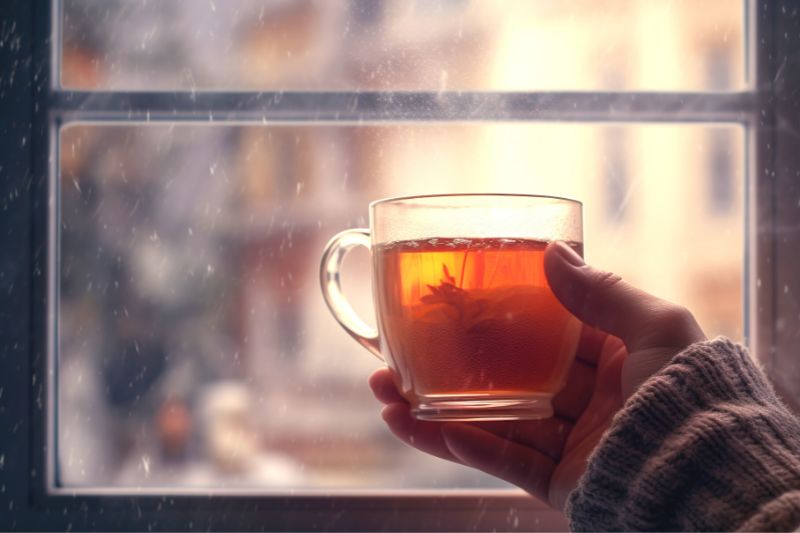
The best plants to treat a cold
The garden is a true open-air pharmacy, especially when it comes to tackling the minor symptoms of a cold. From plants with antiviral properties to herbs that soothe the throat, discover below a small selection of the most renowned plants for preparing effective herbal teas:
Peppermint
Peppermint (Mentha piperita) is appreciated for its refreshing aroma, primarily found in hot beverages after meals. Traditionally, peppermint leaves are used in infusions to help clear the breathing passages and provide a cooling sensation. They are also known to aid digestion.
Thyme
Thyme is an aromatic plant used both in cooking and in infusions. Dried thyme leaves are reputed to soothe coughs, sore throats, and have an expectorant effect. Additionally, thyme contains antioxidants that may help strengthen the body's defenses. Use it as soon as your throat starts to tickle!
Learn more in How to Treat a Cold Naturally with Thyme?
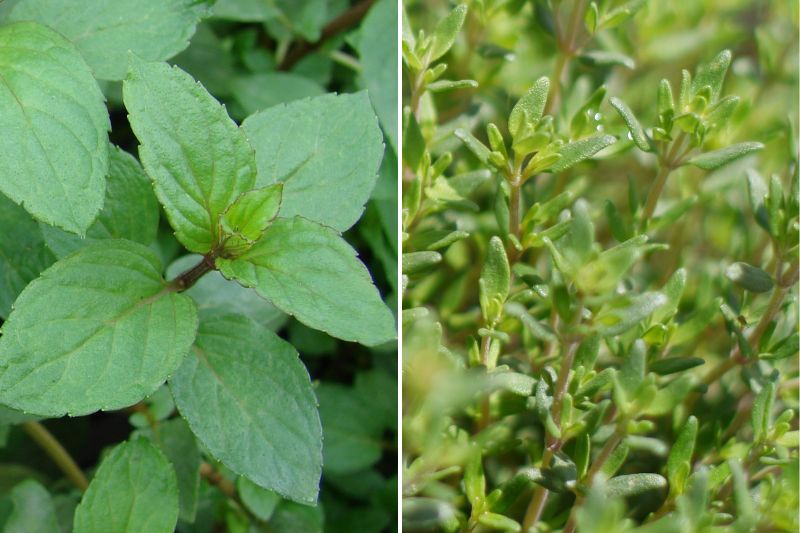
Rosemary
The fragrant leaves of rosemary (Rosmarinus officinalis), known to be rich in antioxidants, are used in infusions to help relieve fatigue, a common symptom of a cold. It is also attributed with anti-inflammatory properties and may alleviate pain, perfect for minor headaches!
Sage
With its grey-green leaves, common sage (Salvia officinalis) is a plant traditionally used for its ability to soothe sore throats and oral inflammations.

Elderflowers
In infusion, dried elderflowers (Sambucus nigra) are said to promote sweating and thus help reduce fever. Additionally, they are traditionally used for treating minor respiratory infections.
Lavender
Lavender is best known for its relaxing properties. Its flowers (Lavandula angustifolia) are often used in herbal tea to help relieve stress, migraines, and promote restorative sleep. Perfect for recovering from temporary fatigue!
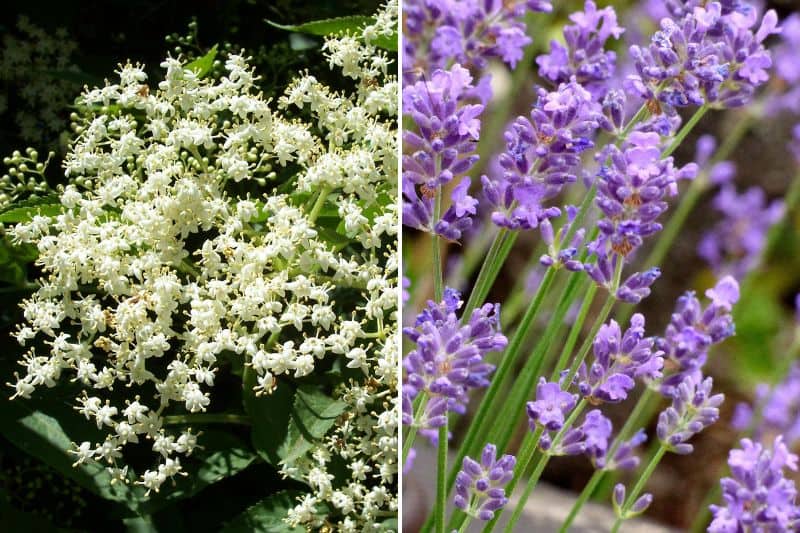
Chamomile
Like lavender, the small white flowers of Roman chamomile (Chamaemelum nobile) and German chamomile (Matricaria chamomilla) are known to help reduce stress, anxiety, and thus restore quality sleep. They are also believed to have anti-inflammatory and decongestant properties.
Eucalyptus
Eucalyptus is a plant with fragrant leaves, appreciated for its distinctive aroma. Traditionally, eucalyptus leaves (Eucalyptus globulus) are used in infusions to help clear the breathing passages and soothe sore throats.
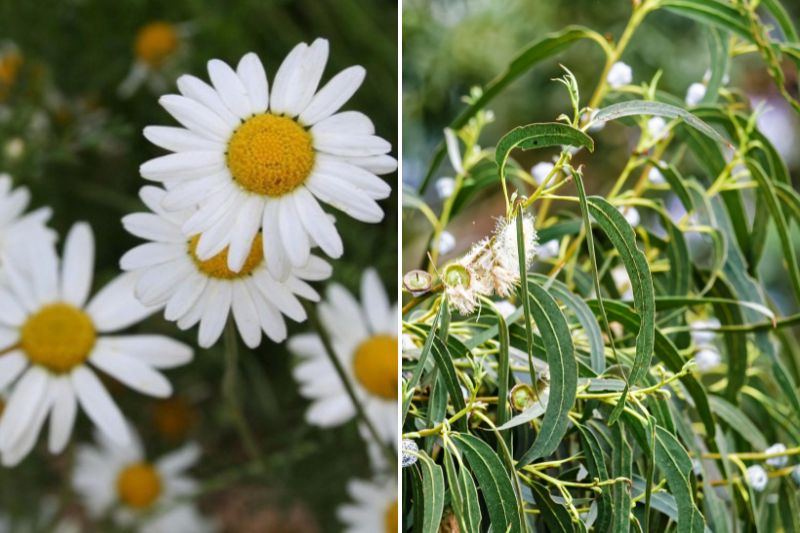
Note:
Each of the plants mentioned above can be infused individually, but by combining them, you gather their various benefits into a single infusion.
5 herbal tea recipes to relieve a cold
Herbal teas are a pleasant and natural way to relieve cold symptoms, all while sipping a warm drink, snugly wrapped in a blanket on your sofa. Here are five different recipes, each targeting specific symptoms, to help you feel better.
Recipe 1: Thyme, lemon, and honey herbal tea
Ideal for: cough and sore throat
- Ingredients:
- 1 tablespoon of dried thyme leaves
- 1 half lemon
- 1 teaspoon of honey
- Preparation: Infuse one tablespoon of thyme in a cup of hot water for 5 to 7 minutes. Add the juice of half a lemon and a teaspoon of honey.
- Usage: Drink hot, up to three times a day.
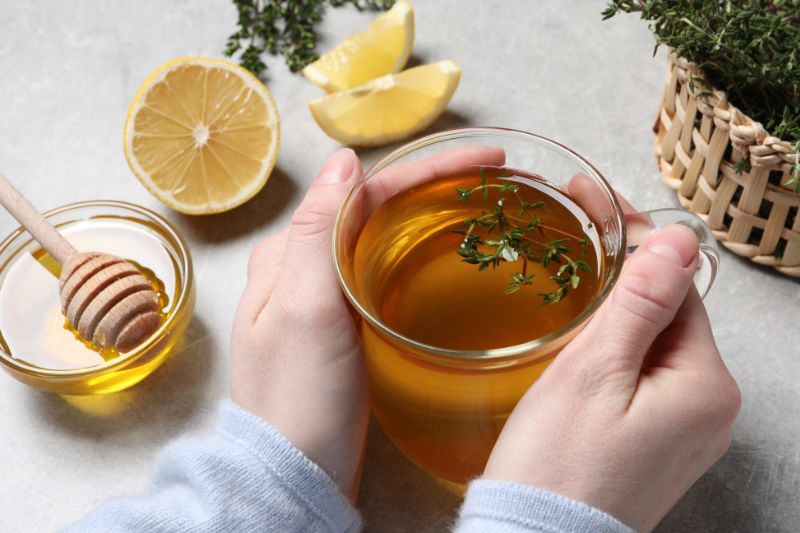
Recipe 2: Peppermint and lavender herbal tea
Ideal for: clearing the breathing passages
- Ingredients:
- 1 tablespoon of peppermint leaves
- 1 teaspoon of lavender flowers
- Preparation: Infuse one tablespoon of peppermint and one teaspoon of lavender flowers in a cup of hot water for 5 minutes.
- Usage: Drink hot, up to twice a day.
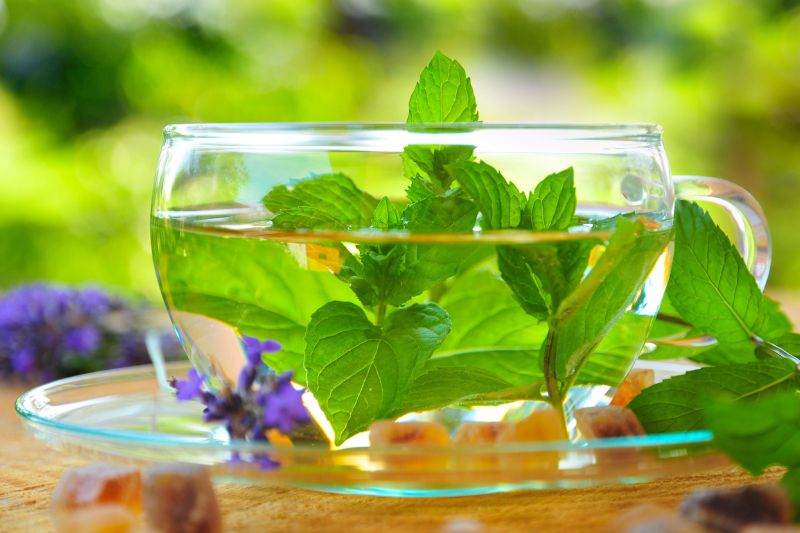
Recipe 3: Sage and elderflower herbal tea
Ideal for: strengthening the immune system
- Ingredients:
- 1 tablespoon of sage leaves
- 1 teaspoon of elderflowers
- Preparation: Infuse one tablespoon of sage leaves and one teaspoon of elderflowers in a cup of hot water for 7 minutes.
- Usage: Drink hot, once a day.
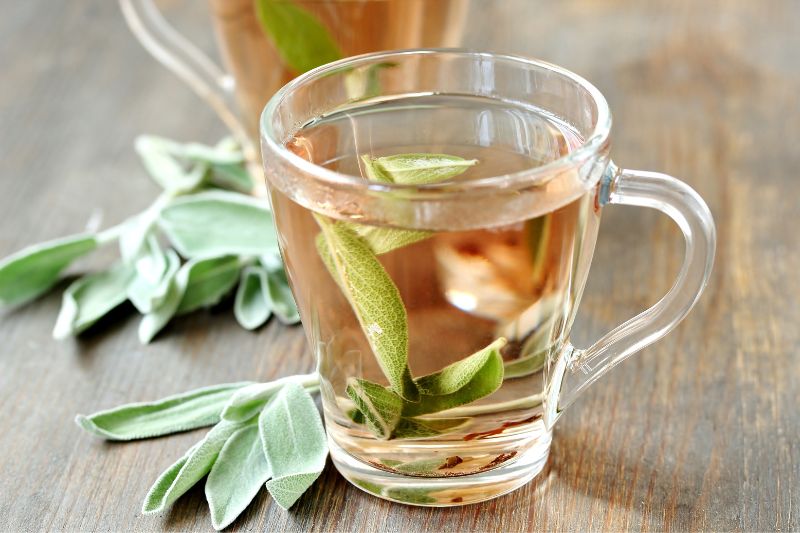
Recipe 4: Rosemary and eucalyptus herbal tea
Ideal for: fatigue and nasal congestion
- Ingredients:
- 1 tablespoon of rosemary leaves
- 1 teaspoon of eucalyptus leaves
- Preparation: Infuse one tablespoon of rosemary leaves and one teaspoon of eucalyptus leaves in a cup of hot water for 7 minutes.
- Usage: Drink hot, up to twice a day.
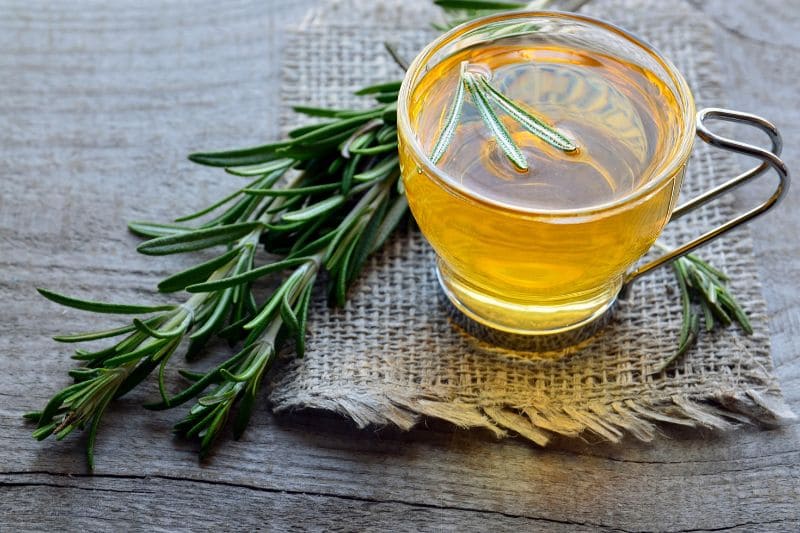
Recipe 5: Chamomile and lavender tea
Ideal for: stress and disturbed sleep
- Ingredients:
- 1 tablespoon of chamomile flowers
- 1 teaspoon of lavender flowers
- Preparation: Infuse one tablespoon of chamomile flowers and one teaspoon of lavender flowers in a cup of hot water for 5 minutes.
- Usage: Drink hot, preferably before bed for restorative sleep.
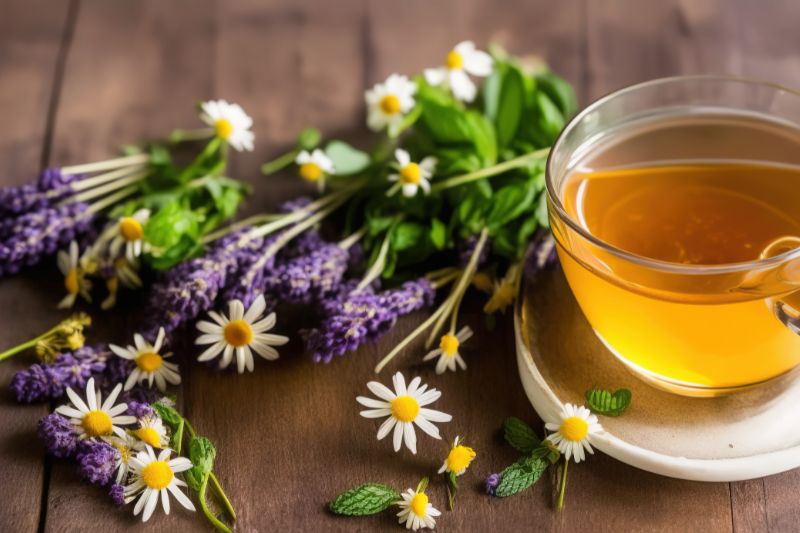
Precautions to take
While herbal teas are a natural method to relieve cold symptoms, it is important to take certain precautions for safe use.
Number of cups per day
Most herbal teas can be consumed up to three times a day.
Although herbal teas are a natural option for relieving cold symptoms, it is recommended not to consume the same infusion every day for an extended period. Generally, the maximum advised duration for daily consumption of the same herbal tea is 6 to 8 weeks. Beyond that, it is better to vary the plants or consult a healthcare professional if you still have persistent symptoms.
Allergies
Before consuming a new plant, ensure you are not allergic. If you experience symptoms such as itching, rashes, or breathing difficulties, stop consumption immediately and consult a doctor promptly.
Drug interactions
Some plants may interact with medications. If you are taking prescription medications, consult your doctor for medical advice.
When to consult a healthcare professional?
If cold symptoms persist for more than a week, or if you experience severe symptoms such as a high fever or breathing difficulties, it is crucial to consult a healthcare professional for an appropriate diagnosis and treatment.






























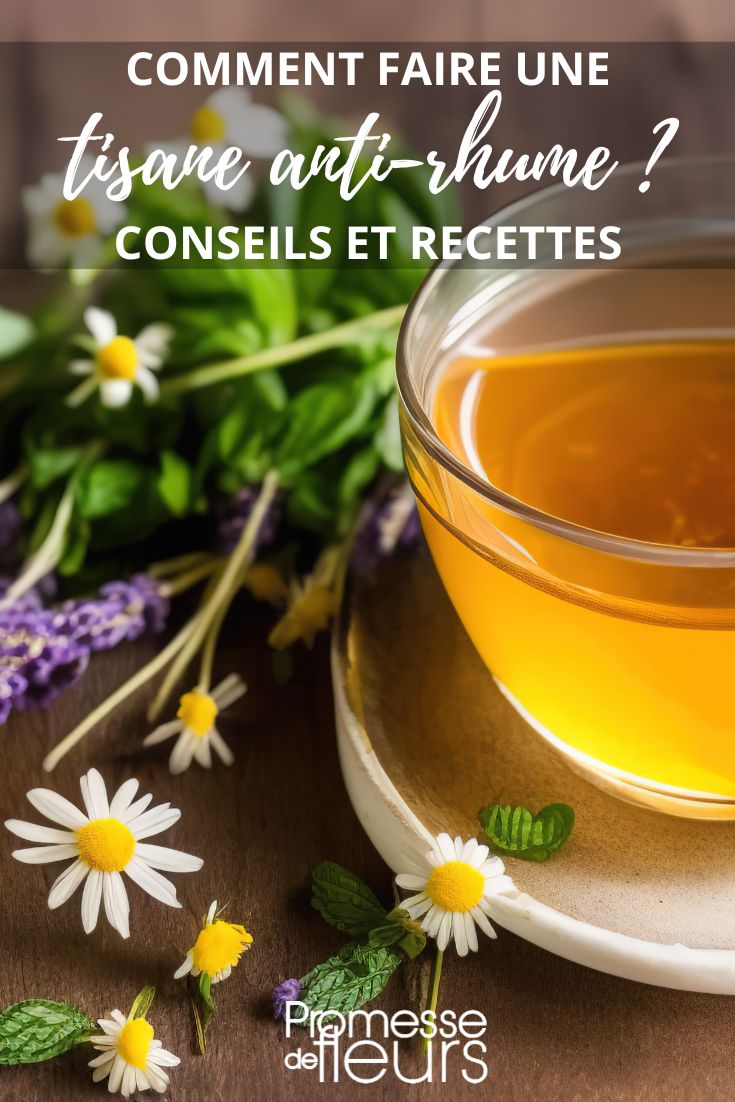
Comments